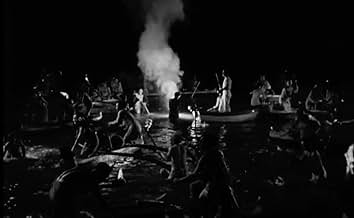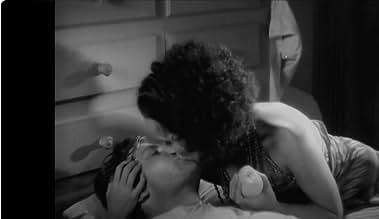IMDb-BEWERTUNG
6,0/10
1720
IHRE BEWERTUNG
Füge eine Handlung in deiner Sprache hinzuA native girl falls for a visitor to her island, but she's chosen to be sacrificed to the volcano god.A native girl falls for a visitor to her island, but she's chosen to be sacrificed to the volcano god.A native girl falls for a visitor to her island, but she's chosen to be sacrificed to the volcano god.
- Auszeichnungen
- 1 wins total
Dolores Del Río
- Luana
- (as Dolores del Rio)
Lon Chaney Jr.
- Thornton
- (as Creighton Chaney)
Mailoa Kalili
- Child on Beach
- (Nicht genannt)
Freddie Letuli
- Child on Beach
- (Nicht genannt)
Kuka Tuima
- Child on Beach
- (Nicht genannt)
Empfohlene Bewertungen
This film is a good example of Pre-Code Hollywood Essentially the story of a sailor who falls in love with a native girl, this film has numerous examples of how Hollywood flourished before the production code set in some 3 years later. In most of the film Dolores Del Rio runs around in a straw skirt with nothing but a lei covering her breasts. In scenes where she is swimming, she appears to be totally nude with just some distortion in the water keeping us from seeing her totally naked. Also co-star Joel McCrea spends a good deal of the film walking around in his bathing suit.
The love scenes between McCrea and Del Rio vary. The first time it looks like rape, and Del Rio looks like she is visibly in pain. 3 years later the production code would not permit a white man to wed or be romantically involved with anyone but a white woman.
Among the crew of the ship is Richard "Skeets" Gallagher, who plays a stereotypically gay role, along with another sailor on the ship.
This film is now in the public domain and can frequently be found on television, and is available on DVD.
The love scenes between McCrea and Del Rio vary. The first time it looks like rape, and Del Rio looks like she is visibly in pain. 3 years later the production code would not permit a white man to wed or be romantically involved with anyone but a white woman.
Among the crew of the ship is Richard "Skeets" Gallagher, who plays a stereotypically gay role, along with another sailor on the ship.
This film is now in the public domain and can frequently be found on television, and is available on DVD.
One really couldn't ask for more than hunky Joel MCrea and gorgeous Delores del Rio as eye candy in "Bird of Paradise," a 1932 film - which makes it precode and quite sexy. McCrea plays a young man on a yachting trip who is saved from a shark by a South seas beauty named Luana; he decides to stay on awhile. When it becomes clear to him that she is to be sacrificed to the volcano Pele, the two escape to an island, where they lead an idyllic life together. Eventually his friends return for him, and he assumes Luana will go with him.
Not a huge amount of dialogue, but lots to look at in this King Vidor film, which has jungle choreography by Busby Berkley and music by Max Steiner, both pre-Warner Brothers. Del Rio doesn't wear much; in fact, she has a nude swimming scene. McCrea here is very athletic.
Amazing what they were able to do precode that in a couple of years would be taboo. Worth seeing. Del Rio was one of the most beautiful stars ever, and McCrea one of the most appealing.
Not a huge amount of dialogue, but lots to look at in this King Vidor film, which has jungle choreography by Busby Berkley and music by Max Steiner, both pre-Warner Brothers. Del Rio doesn't wear much; in fact, she has a nude swimming scene. McCrea here is very athletic.
Amazing what they were able to do precode that in a couple of years would be taboo. Worth seeing. Del Rio was one of the most beautiful stars ever, and McCrea one of the most appealing.
A young man, sailing the South Seas with friends, is saved from a shark by a lovely chief's daughter. They fall madly in love, only to have him learn that his beautiful BIRD OF PARADISE is destined to be sacrificed to Pele, the volcano god.
Essentially a piece of fluff, this film is enhanced by the performances of Dolores Del Rio & Joel McCrea. They handle the romantics quite nicely (her skinny dip providing proof this is a pre-Production Code movie). The rest of the cast, which includes Lon Chaney Jr. & 'Skeets' Gallagher, exist purely to provide support to the stars.
Location filming in Hawaii and a beautiful, evocative score by Max Steiner emphasize the languid mood of the plot.
Essentially a piece of fluff, this film is enhanced by the performances of Dolores Del Rio & Joel McCrea. They handle the romantics quite nicely (her skinny dip providing proof this is a pre-Production Code movie). The rest of the cast, which includes Lon Chaney Jr. & 'Skeets' Gallagher, exist purely to provide support to the stars.
Location filming in Hawaii and a beautiful, evocative score by Max Steiner emphasize the languid mood of the plot.
This feature is interesting in a number of respects, both in its techniques and in its subject matter. And if neither of those is enough, Dolores Del Rio has a role that allows her to dazzle the viewer with her beauty and her screen presence. A young-looking Joel McCrea, as her co-star, is himself earnest and likable, though he is overshadowed by Del Rio in their scenes together.
The story starts off with McCrea, as a sailor on a yacht, being rescued from a shark by Del Rio, as the daughter of the king of a native tribe. Romance develops from there, with McCrea's character dreaming of taking her back home with him when his trip is done, but having his plans hindered by the responsibilities she faces as a king's daughter. (Why any man, given the opportunity to live alone with a woman like Del Rio on a tropical island, would yearn for 'civilization', is also a pretty good question.)
The story features some rather sensitive themes in the running contact between the two cultures. If it does not always face them comfortably, at least it is relatively even-handed much of the time. Although some 'primitive' beliefs are ascribed to the natives' culture, they are portrayed as sincere beliefs. There are also a number of points of interest on the technical side. Most obviously, there are the wealth of atmospheric shots of the tropical setting. But beyond that, there are a few interesting attempts to offer some interesting views with the camera, such as the water-level shots in the opening sailing sequence.
One particularly interesting idea is that, for a long time, the language barrier is allowed to stand realistically between the characters, especially in McCrea's efforts to communicate, instead of using a stock device to get around it. Only much later is it assumed that Del Rio's character has learned enough English to be able to communicate.
Certainly, there are times when this feature shows a little of its age, and in some respects it's not completely successful. But it would probably be worth watching to see Del Rio alone, and the rest of it contains several interesting aspects.
The story starts off with McCrea, as a sailor on a yacht, being rescued from a shark by Del Rio, as the daughter of the king of a native tribe. Romance develops from there, with McCrea's character dreaming of taking her back home with him when his trip is done, but having his plans hindered by the responsibilities she faces as a king's daughter. (Why any man, given the opportunity to live alone with a woman like Del Rio on a tropical island, would yearn for 'civilization', is also a pretty good question.)
The story features some rather sensitive themes in the running contact between the two cultures. If it does not always face them comfortably, at least it is relatively even-handed much of the time. Although some 'primitive' beliefs are ascribed to the natives' culture, they are portrayed as sincere beliefs. There are also a number of points of interest on the technical side. Most obviously, there are the wealth of atmospheric shots of the tropical setting. But beyond that, there are a few interesting attempts to offer some interesting views with the camera, such as the water-level shots in the opening sailing sequence.
One particularly interesting idea is that, for a long time, the language barrier is allowed to stand realistically between the characters, especially in McCrea's efforts to communicate, instead of using a stock device to get around it. Only much later is it assumed that Del Rio's character has learned enough English to be able to communicate.
Certainly, there are times when this feature shows a little of its age, and in some respects it's not completely successful. But it would probably be worth watching to see Del Rio alone, and the rest of it contains several interesting aspects.
A very beautiful & romantic film. It's about a lovely native woman named Luana (Dolores del Rio) and the man that falls in-love with her, Johnny Baker (Joel McCrea). Luana is chosen by the other island natives to be sacrificed to the volcano. This is a story we've all heard of by now but this might be the first film on the subject matter.
I discovered this film via Creighton Chaney. I was looking to watch a film from him that I have yet to see. He's not in this one very much, his character Thornton is more of a supporting role, but he did not have to be in this film for me to enjoy it. I'm glad to discover it because it's a wonderful story.
8/10
I discovered this film via Creighton Chaney. I was looking to watch a film from him that I have yet to see. He's not in this one very much, his character Thornton is more of a supporting role, but he did not have to be in this film for me to enjoy it. I'm glad to discover it because it's a wonderful story.
8/10
Wusstest du schon
- WissenswertesFilm debut of Lon Chaney Jr., billed under his real name of Creighton Chaney.
- PatzerAt about the 16:00 mark there is a medium shot of 3 characters. The one on the right pulls off his sweater and begins to unbutton his shirt. He is then shown in a 2 character shot still wearing the sweater, followed by another medium shot with the sweater off.
- Zitate
Chester: What do they call this place?
Johnny Baker: Probably one of the Virgin Islands
Chester: Heaven forbid.
- VerbindungenEdited into Graf Zaroff - Genie des Bösen (1932)
- SoundtracksWhere the Blue of the Night (Meets the Gold of the Day)
(1931) (uncredited)
Music by Fred E. Ahlert
Sung (with non-lexical vocables) by Johnny as Luana pulls his dinghy to shore.
Top-Auswahl
Melde dich zum Bewerten an und greife auf die Watchlist für personalisierte Empfehlungen zu.
- How long is Bird of Paradise?Powered by Alexa
Details
- Erscheinungsdatum
- Herkunftsland
- Sprachen
- Auch bekannt als
- Luana: Eine Schreckensnacht auf Hawaii
- Drehorte
- Hawaii, USA(2nd unit establishing shots)
- Produktionsfirma
- Weitere beteiligte Unternehmen bei IMDbPro anzeigen
Box Office
- Budget
- 752.000 $ (geschätzt)
- Laufzeit
- 1 Std. 20 Min.(80 min)
- Farbe
- Seitenverhältnis
- 1.37 : 1
Zu dieser Seite beitragen
Bearbeitung vorschlagen oder fehlenden Inhalt hinzufügen






























